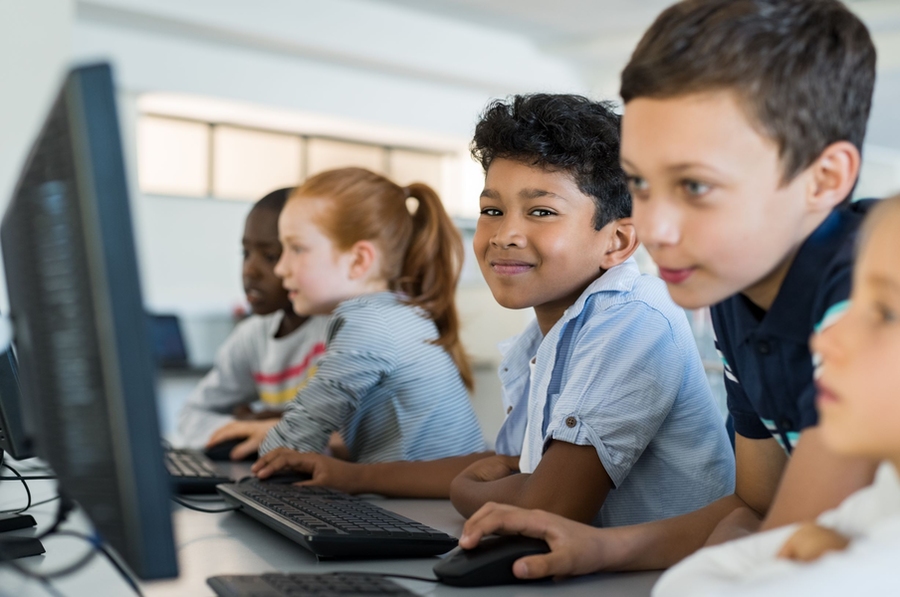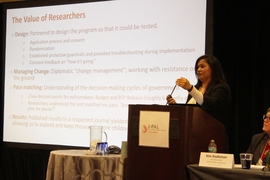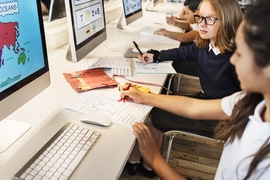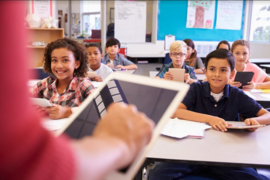J-PAL North America, a research center at MIT, will partner with two leading education technology nonprofits to test promising models to improve learning, as part of the center’s second Education, Technology, and Opportunity Innovation Competition.
Running in its second year, J-PAL North America’s Education, Technology, and Opportunity Innovation Competition supports education leaders in using randomized evaluations to generate evidence on how technology can improve student learning, particularly for students experiencing poverty or facing barriers to academic success. Last year, J-PAL North America partnered with the Family Engagement Lab to develop an evaluation of a multilingual digital messaging platform, and with Western Governors University’s Center for Applied Learning Science to evaluate scalable models to improve student learning in math.
This year, J-PAL North America will continue its work to support rigorous evaluations of educational technologies aimed to reduce disparities by partnering with Boys & Girls Clubs of Greater Houston, a youth-development organization that provides education and social services to students from low-income families, and MIND Research Institute, a nonprofit committed to improving math education.
“Even just within the first and second year of the J-PAL ed-tech competition, there continues to be an explosion in promising new initiatives,” says Philip Oreopoulos, professor of economics at the University of Toronto and co-chair of the J-PAL Education, Technology, and Opportunity Initiative. “We’re excited to try to help steer this development towards the most promising and effective programs for improving academic success and student well-being.”
Boys & Girls Clubs of Greater Houston will partner with J-PAL North America to develop an evaluation of the BookNook reading app, a research-based intervention technology that aims to improve literacy skills of K-8 students.
“One of our commitments to our youth is to prepare them to be better citizens in life, and we do this through our programming, which supplements the education they receive in school,” says Michael Ewing, director of programs at Boys & Girls Clubs of Greater Houston. “BookNook is one of our programs that we know can increase reading literacy and help students achieve at a higher level. We are excited about this opportunity to conduct a rigorous evaluation of BookNook’s technology because we can substantially increase our own accountability as an organization, ensuring that we are able to track the literacy gains of our students when the program is implemented with fidelity.”
Children who do not master reading by a young age are often placed at a significant disadvantage to their peers throughout the rest of their development. However, many effective interventions for students struggling with reading involve one-on-one or small-group instruction that places a heavy demand on school resources and teacher time. This makes it particularly challenging for schools that are already resource-strapped and face a shortage of teachers to meet the needs of students who are struggling with reading.
The BookNook app offers a channel to bring research-proven literacy intervention strategies to greater numbers of students through accessible technology. The program is heavily scaffolded so that both teachers and non-teachers can use it effectively, allowing after-school staff like those at Boys & Girls Clubs of Greater Houston to provide adaptive instruction to students struggling with reading.
“Our main priority at BookNook is student success,” says Nate Strong, head of partnerships at for the BookNook team. “We are really excited to partner with J-PAL and with Boys & Girls Clubs of Greater Houston to track the success of students in Houston and learn how we can do better for them over the long haul.”
MIND Research Institute seeks to partner with J-PAL North America to develop a scalable model that will increase students’ conceptual understanding of mathematical concepts. MIND’s Spatial Temporal (ST) math program is a pre-K-8 visual instructional program that leverages the brain's spatial-temporal reasoning ability using challenging visual puzzles, non-routine problem solving, and animated informative feedback to understand and solve mathematical problems.
“We’re thrilled and honored to begin this partnership with J-PAL to build our capacity to conduct randomized evaluations,” says Andrew Coulson, chief data science officer for MIND. “It's vital we continue to rigorously evaluate the ability of ST Math's spatial-temporal approach to provide a level playing field for every student, and to show substantial effects on any assessment. With the combination of talent and experience that J-PAL brings, I expect that we will also be exploring innovative research questions, metrics and outcomes, methods and techniques to improve the applicability, validity and real-world usability of the findings.”
J-PAL North America is excited to work with these two organizations and continue to support rigorous evaluations that will help us better understand the role technology should play in learning. Boys & Girls Clubs of Greater Houston and MIND Research Institute will help J-PAL contribute to growing evidence base on education technology that can help guide decision-makers in understanding which uses of education technology are truly helping students learn amidst a rapidly-changing technological landscape.
J-PAL North America is a regional office of the Abdul Latif Jameel Poverty Action Lab. J-PAL was established in 2003 as a research center at MIT’s Department of Economics. Since then, it has built a global network of affiliated professors based at over 58 universities and regional offices in Africa, Europe, Latin America and the Caribbean, North America, South Asia, and Southeast Asia. J-PAL North America was established with support from the Alfred P. Sloan Foundation and Arnold Ventures and works to improve the effectiveness of social programs in North America through three core activities: research, policy outreach, and capacity building. J-PAL North America’s education technology work is supported by the Overdeck Family Foundation and Arnold Ventures.









